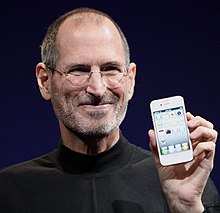Steve Jobs
 Visit Steeve's current page on Wiki
Visit Steeve's current page on Wiki
Steven Paul Jobs (February 24, 1955 – October 5, 2011) was an American businessman, inventor, and investor best known for co-founding the technology giant Apple Inc. Jobs was also the founder of NeXT and chairman and majority shareholder of Pixar. He was a pioneer of the personal computer revolution of the 1970s and 1980s, along with his early business partner and fellow Apple co-founder Steve Wozniak.
Contents
Early Life
Paul Jobs worked in several jobs that included a try as a machinist,[10] several other jobs,[11] and then "back to work as a machinist".
Paul and Clara adopted Jobs's sister Patricia in 1957,[12] and by 1959 the family had moved to the Monta Loma neighborhood in Mountain View, California.[13] Paul built a workbench in his garage for his son in order to "pass along his love of mechanics". Jobs, meanwhile, admired his father's craftsmanship "because he knew how to build anything. If we needed a cabinet, he would build it. When he built our fence, he gave me a hammer so I could work with him ... I wasn't that into fixing cars ... but I was eager to hang out with my dad."[14] By the time he was ten, Jobs was deeply involved in electronics and befriended many of the engineers who lived in the neighborhood.[15][page needed] He had difficulty making friends with children his own age, however, and was seen by his classmates as a "loner".
Health Problem
In October 2003, Jobs was diagnosed with cancer. In mid-2004, he announced to his employees that he had a cancerous tumor in his pancreas.[159] The prognosis for pancreatic cancer is usually very poor;[160] Jobs stated that he had a rare, much less aggressive type, known as islet cell neuroendocrine tumor.
Jobs resisted his doctors' recommendations for medical intervention for nine months,[161] in favor of alternative medicine. Other doctors agree that Jobs's diet was insufficient to address his disease. However, cancer researcher and alternative medicine critic David Gorski wrote that "it's impossible to know whether and by how much he might have decreased his chances of surviving his cancer through his flirtation with woo. My best guess was that Jobs probably only modestly decreased his chances of survival, if that."[162][163] Barrie R. Cassileth, the chief of Memorial Sloan Kettering Cancer Center's integrative medicine department,[164] on the other hand, said, "Jobs's faith in alternative medicine likely cost him his life ... He had the only kind of pancreatic cancer that is treatable and curable ... He essentially committed suicide."[165] According to biographer Walter Isaacson, "for nine months he refused to undergo surgery for his pancreatic cancer – a decision he later regretted as his health declined".[166] "Instead, he tried a vegan diet, acupuncture, herbal remedies, and other treatments he found online, and even consulted a psychic. He was also influenced by a doctor who ran a clinic that advised juice fasts, bowel cleansings and other unproven approaches, before finally having surgery in July 2004."[167][168] He underwent a pancreaticoduodenectomy (or "Whipple procedure") that appeared to remove the tumor successfully.[169][170] Jobs did not receive chemotherapy or radiation therapy.[159][171] During Jobs's absence, Tim Cook, head of worldwide sales and operations at Apple, ran the company.
In January 2006, only Jobs's wife, his doctors, and Iger knew that his cancer had returned. Jobs told Iger privately that he hoped to live to see his son Reed's high school graduation in 2010.[125] In early August 2006, Jobs delivered the keynote for Apple's annual Worldwide Developers Conference. His "thin, almost gaunt" appearance and unusually "listless" delivery,[172][173] together with his choice to delegate significant portions of his keynote to other presenters, inspired a flurry of media and internet speculation about the state of his health.[174] In contrast, according to an Ars Technica journal report, Worldwide Developers Conference (WWDC) attendees who saw Jobs in person said he "looked fine".[175] Following the keynote, an Apple spokesperson said that "Steve's health is robust".
Award
- 1985: awarded National Medal of Technology (with Steve Wozniak) by US President Ronald Reagan, the country's highest honor for technological achievements[291]
- 1987: Jefferson Award for Public Service[292]
- 1989: Entrepreneur of the Decade by Inc.[293]
- 1991: Howard Vollum Award from Reed College[294]
- 2004–2010: listed among the Time 100 Most Influential People in the World on five separate occasions[295]
- 2007: named the most powerful person in business by Fortune magazine[296]
- 2007: inducted into the California Hall of Fame, located at The California Museum for History, Women and the Arts[297]
- 2012: Grammy Trustees Award, an award for those who have influenced the music industry in areas unrelated to performance[298]
- 2012: posthumously honored with an Edison Achievement Award for his commitment to innovation throughout his career[299]
- 2013: posthumously inducted as a Disney Legend[300]
- 2017: Steve Jobs Theater opens at Apple Park[301]
- 2022: posthumously awarded the Presidential Medal of Freedom by US President Joe Biden, the country's highest civilian honor
home page peer level file